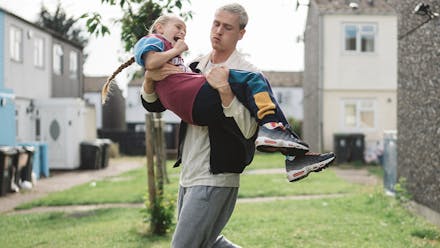Charlotte Regan’s debut feature Scrapper bears some resemblance to Charlotte Wells’ first film Aftersun — both are stories of grief and struggling father-daughter relationships. But while both speak to a bold new confidence in British filmmaking, Scrapper exists in its own world, manifesting in wildly different ways to Wells'. For Regan, that world is colourful, hopeful and full of spirit, far removed from the kitchen sink-isms too often considered a requirement for social-realist cinema telling working-class stories.

Georgie (a prickly but powerful Lola Campbell) is the hero of her loud, proud and messy life: she wears football shirts as armour, builds bike parts into bed frames, and looks to a couple of house spiders (to whom she lends voices) as unlikely friends. It all speaks to Regan’s vibrant spirit as a filmmaker, alongside cinematographer Molly Manning Walker (whose own directorial debut, How To Have Sex, arrives later this year).
Charlotte Regan's sharp eye and bold vision feels like the work of a filmmaker with decades more experience behind them
Scrapper is a shapeshifter, walking a delicate tonal tightrope between humour and sincere tenderness. Georgie would probably try to brush that tenderness off, but her dad Jason (Harris Dickinson, ever-reliable and impressive) knows it’s the only option to really connect with her. It’s refreshing to see a father-daughter narrative that avoids trappings of formulaic conflict, but also of saccharine reunions that rely a little too much on illogical ideas of destiny. Georgie and Jason are just doing their best with what they have, and who they are.
It’s a learning curve for all involved — approached with great emotional intelligence and wit by Regan, whose sharp eye and bold vision feels like the work of a filmmaker with decades more experience behind them. But perhaps, like Georgie, some people are just born to tell their stories. From great sadness comes a big-hearted world it’s a pleasure to be introduced to.
